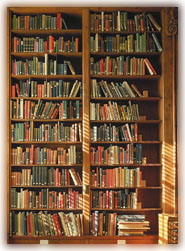
Main Menu ·
Search ·Current Issue ·Contact ·Archives
·Centennial ·Letters
to the Editor ·FAQs
 In this issue's Alumni section:
In this issue's Alumni section:
Books: Working Poor -
Music: Sax Appeal -
Open Book: The College of Conversation -
Off the Shelf -
Chapter & Verse

The College of Conversation
Wendy Lesser '73, founding editor of the quarterly Threepenny Review, has written four books of literary and social criticism and now a witty, modest, and in other ways appealing collection of essays about events she has witnessed on stage, screen, canvas, and paper or otherwise experienced. From The Amateur: An Independent Life of Letters (Pantheon, $24), here's Lesser's recollection of the texture of her Harvard days.
 In the Dunster House Library. CHRISTOPHER S. JOHNSON
In the Dunster House Library. CHRISTOPHER S. JOHNSON |
A habitually early riser, I would be in the Dunster dining room at the start of breakfast--say, 7:30 or 8:00--and would stay there for roughly an hour and a half, chatting with a gradually expanding group of my friends. Then I'd go back to my rooms (my "suite," as it was rather pretentiously called) and read until lunch, at which I would spend a full two hours talking with an even larger gathering. Ditto for dinner. In between I might have an afternoon seminar which required me to go out, but I tried to keep these academic engagements down to two or at most three days a week. I almost never took a morning lecture course--partly because that would have required me to leave home before lunch, and partly because lecture courses entailed exams, which were much less controllable than papers. A seminar paper, I had discovered, could be completed in four days: two days to do the reading and research, one day to write, one day to type. (I used an old pale-blue Hermes portable, which is still taking up space in my basement though I haven't touched the keys in decades.) This meant that reading period--that 16-day stretch of time between the end of classes and the beginning of exams--could be used to complete the work for all four of my courses. And this, in turn, meant that I did no work to speak of during the rest of the semester. Instead, I talked. My memory of college is of one long, intermittently interrupted conversation.
It sounds fun, but in fact we were all pretty miserable. Alumni would show up at times and announce that their Harvard years had been the best of their lives. "Jeez!" we said to each other. "If these are the best years of our lives, I hate to think what comes next!" Some people got so depressed they had breakdowns; the rest of us just muddled through, staying up half the night, drinking, lying around, and endlessly talking. This tedious but addictive routine would be punctuated by
an occasional early-music concert in the Dunster House Library (I particularly remember the golden quality of the late-afternoon light as it came through the tall windows and shone on the library's mellow woodwork, an exact visual counterpart of the rich Bach or Corelli chords we were listening to at the time) or an even more occasional stage performance by Dunster House's resident theater fanatics (including Christopher Durang, who wrote our Christmas pageant, and Al Franken, who starred in it as Saint John the Baptist). But these breaks in the routine were relatively rare. Most of us were content to do nothing day after day.
Main Menu ·
Search ·Current Issue ·Contact ·Archives
·Centennial ·Letters
to the Editor ·FAQs

 In the Dunster House Library. CHRISTOPHER S. JOHNSON
In the Dunster House Library. CHRISTOPHER S. JOHNSON